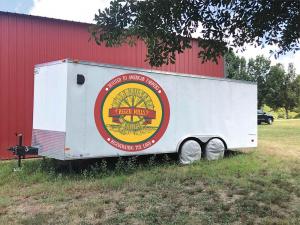2021 - Volume #45, Issue #6, Page #06
[ Sample Stories From This Issue | List of All Stories In This Issue | Print this story
| Read this issue]
Mobile Mill To Process & Package Grain
 |
“A core group of about 10 farmers came up with the concept and the brand name,” says Russell Hedrick. “They include regenerative farmers from Texas to N. Dak. and Okla. to Ind..”
Hedrick raises heritage grains in N. C. (Vol. 43, No. 4), mills them on his farm and markets corn meal, grits and flour under his own brand. These will be the three main products of the mobile mill as well.
Hedrick, Sarah Varble and Liz Haney, all associated with environmental and ag service consulting firm Soil Regen, are heading up the effort.
“The three of us are passionate about bringing profitability to farmers,” says Varble. “We realize that a lot of farmers want to diversify their crops and raise heritage grains, but they don’t have the know-how or finances to set up their own mill. We decided to take the mill to their farms.”
The mobile mill will come to the farm, process the grain and package it. ReGen Mills will charge a small fee for milling and bagging, etc. An 8 by 20-ft. enclosed trailer is currently being outfitted with a stone mill, blower, sifter and packaging system all on 120V power. Everything will be automated from the time the grain comes in until packages are being filled.
“We will pull into the yard and a farmer can pull up with a gravity box and auger and we will start milling,” says Hedrick. “All the farmer will need to buy is a freezer to store the product.”
Packaging will have a consistent message about how the grain is grown regeneratively (with no-till, cover crops and reduced outside inputs). “The back of the bag will have a profile of the farmer who produced the grain and a code that will link to a video on our website.”
The overriding goal is to fill a niche between on-farm efforts like Hedrick’s and regional grain processors. “We’ve seen larger companies try to scale up marketing of products from regenerative farms,” says Haney. “However, we know the supply isn’t there right now. By the time grain is trucked to a central location, costs are too high. Instead, we will come to the farm.”
Hedrick points out that a 150-bushel corn crop will net about $250 per acre as a commodity. However, products made with that corn will retail for about $35,000.
“The farmers we have spoken with are excited about taking out the middleman,” he says.
Haney adds that the goal is not to sell through a big box store, but to sell direct, farm-to-market. “Consumers will get these products straight from the farm,” says Haney. “At the same time, they will learn about the farm and the practices the farmer is implementing to improve soil health and on-farm resilience.”
Quality control is key in any brand. “We will have a system in place to verify the quality of the grain and the practices behind it,” says Hedrick.
“Everyone we deal with will be part of the ReGen soil health family,” adds Varble.
If the mobile mill is as successful as Varble, Haney and Hedrick hope, more mobile mills will follow.
Contact: FARM SHOW Followup, ReGen Mills, 1181 E. Creekview Dr., Salado, Texas 76571 (sarah.varble@agsoilregen.com; liz.haney@agsoilregen; russell@agsoilregen.com; www.agsoilregen.com).

Click here to download page story appeared in.

Click here to read entire issue
To read the rest of this story, download this issue below or click here to register with your account number.




